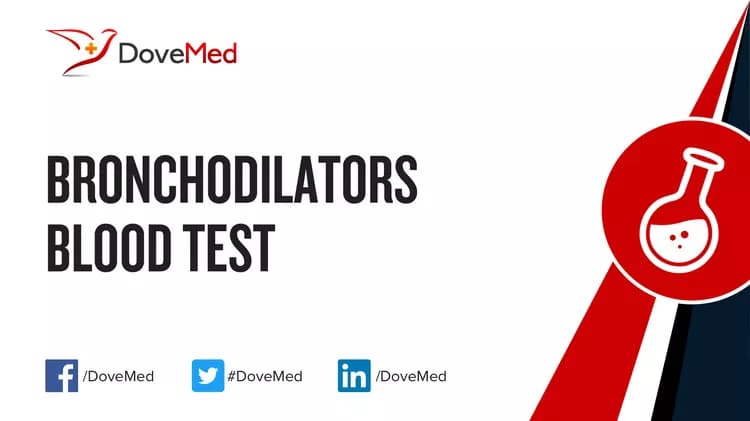What are other Names for this Test? (Equivalent Terms)
- Beta-Agonists Blood Test
- Bronchodilator Levels Blood Test
- ß-Agonists Blood Test
What is the Bronchodilators Blood Test? (Background Information)
- Bronchodilators are medications that relax the muscles of the airways, causing bronchodilation (airway enlargement). This allows air to pass through the airways easier
- Bronchodilators are used to treat COPD (chronic obstructive pulmonary disease) and other conditions associated with difficult breathing
- There are three different kinds of bronchodilators: Beta-agonists, anticholinergics, and theophyllines. All three cause bronchodilation, but they do so in different ways
- Beta-agonists work by binding to beta-receptors in the muscles surrounding small airways (bronchioles), causing them to relax. Beta-agonists can be short-acting or long-acting
- Short-acting beta-agonists work within 3-5 minutes, but only last 4-6 hours. They are used in case of an emergency. An example is albuterol
- Long-acting beta-agonists take 20 minutes to take effect, but last up to 12 hours. They are used as maintenance medications. An example is formoterol
- Anticholinergics work by blocking the chemical messenger acetylcholine, causing the muscles around large airways (bronchi) to relax. Like beta-agonists, anticholinergics can be short-acting or slow-acting
- Short-acting anticholinergics work within 15 minutes and last 6-8 hours. An example is Atrovent
- Long-acting anticholinergics take 20 minutes to take effect and last 24 hours. They include Spiriva
- Beta-agonists and anticholinergics are typically administered via inhaler or nebulizer. Inhalers are portable and include NDIs and DPIs
- Inhalers and nebulizers both turn liquid bronchodilator medications into a fine mist that can be inhaled. However, inhalers are portable and easier to use than nebulizers, which also take longer to administer the medication
- Theophyllines are found naturally in chocolate, coffee, and tea. They are structurally similar to caffeine and exhibit similar stimulatory effects. They also cause widening of the bronchioles, by expanding the airways
- Like other drugs, bronchodilators must be kept within a certain range to prevent unwanted effects. If the levels are too high, it may lead to toxicity; if the levels are too low, the drug may not successfully expand the airways
- The Bronchodilators Blood Test helps determine the levels of beta-agonists, anticholinergics, and theophyllines in blood. It is used to ensure that the levels of bronchodilator medications stay within an acceptable range. It is also used to detect bronchodilator toxicity
What are the Clinical Indications for performing the Bronchodilators Blood Test?
Following are the clinical indications for performing the Bronchodilators Blood Test:
- Monitoring bronchodilator therapy
- Suspected bronchodilator toxicity that is marked by:
- Abnormal heartbeat
- Coma
- Difficulty breathing
- Decreased urine output
- Altered mental status
- Nausea and/or vomiting
- Skin discoloration
How is the Specimen Collected for the Bronchodilators Blood Test?
Following is the specimen collection process for Bronchodilators Blood Test:
Sample required: Blood
Process of obtaining blood sample in adults:
- A band is wrapped around the arm, 3-4 inches above the collection site (superficial vein that lies within the elbow pit)
- The site is cleaned with 70% alcohol in an outward spiral, away from the zone of needle insertion
- The needle cap is removed and is held in line with the vein, pulling the skin tight
- With a small and quick thrust, the vein is penetrated using the needle
- The required amount of blood sample is collected by pulling the plunger of the syringe out slowly
- The wrap band is removed, gauze is placed on the collection site, and the needle is removed
- The blood is immediately transferred into the blood container, which has the appropriate preservative/clot activator/anti-coagulant
- The syringe and the needle are disposed into the appropriate “sharp container” for safe and hygienic disposal
Preparation required: No special preparation is needed prior to the test.
What is the Significance of the Bronchodilators Blood Test Result?
A high value (above 20-25 µg/mL) for the Bronchodilators Blood Test may indicate bronchodilator toxicity, which is marked by:
- Abnormal heartbeat
- Coma
- Difficulty breathing
- Decreased urine output
- Altered mental status
- Nausea and/or vomiting
- Skin discoloration
The laboratory test results are NOT to be interpreted as results of a "stand-alone" test. The test results have to be interpreted after correlating with suitable clinical findings and additional supplemental tests/information. Your healthcare providers will explain the meaning of your tests results, based on the overall clinical scenario.
Additional and Relevant Useful Information:
- Some long-lasting anticholinergic medications are not yet available in all countries
Certain medications that you may be currently taking may influence the outcome of the test. Hence, it is important to inform your healthcare provider of the complete list of medications (including any herbal supplements) you are currently taking. This will help the healthcare provider interpret your test results more accurately and avoid unnecessary chances of a misdiagnosis.
The following DoveMed website link is a useful resource for additional information:
Please visit our Laboratory Procedures Center for more physician-approved health information:
http://www.dovemed.com/common-procedures/procedures-laboratory/
Related Articles
Test Your Knowledge
Asked by users
Related Centers
Related Specialties
Related Physicians
Related Procedures
Related Resources
Join DoveHubs
and connect with fellow professionals


0 Comments
Please log in to post a comment.